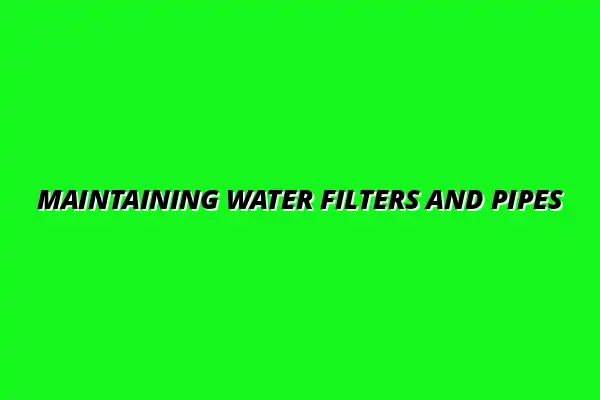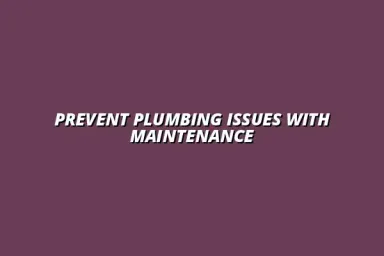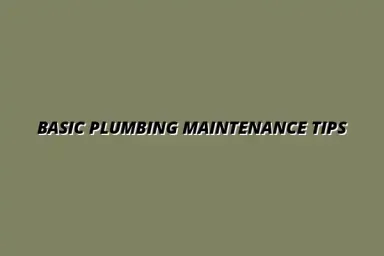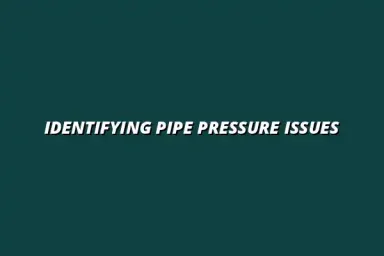Understanding Water Filtration Systems and Plumbing Infrastructure
Water filtration systems play a critical role in ensuring that we have access to clean and safe drinking water. These systems not only improve the taste and odor of your tap water but also remove harmful contaminants. By understanding how these systems work, you can make informed choices that impact your health and the environment.
Additionally, the plumbing infrastructure behind these systems is equally important. It dictates how efficiently water travels from the source to your home. Knowledge of both filtration systems and plumbing can help you maintain a safe and effective water supply. For example, understanding how to maintain your kitchen plumbing is crucial for preventing issues that can affect your entire system.
Importance of Water Filtration Systems
Clean water is essential for our health and the environment. Water filtration systems help to eliminate pollutants that can cause illness and ensure that the water we consume is free from harmful substances. By investing in a good filtration system, you're not only protecting yourself but also contributing to a healthier planet.
Moreover, the benefits of these systems extend beyond individual health. They help reduce the amount of waste generated from bottled water, which is a significant contributor to plastic pollution. Hence, a reliable water filtration system can be a win-win for both your health and the environment!
Benefits of Clean Water for Health and Environment
- Prevention of Illness: Clean water reduces the risk of waterborne diseases.
- Improved Taste: Filtration enhances the taste and odor of drinking water.
- Environmental Protection: Reduces reliance on bottled water, minimizing plastic waste.
- Cost-Effective: Saves money over time compared to purchasing bottled water.
Furthermore, prioritizing clean water can lead to a healthier community and ecosystem. It's amazing how something as simple as filtering your water can make such a big difference!
Common Types of Water Filtration Systems
There are various types of water filtration systems available, each with unique features. Here are some of the most common:
- Activated Carbon Filters: Great for improving taste and removing chlorine.
- Reverse Osmosis Systems: Effective at removing a wide range of contaminants.
- Ultraviolet (UV) Purifiers: Ideal for killing bacteria and viruses.
- Water Softeners: Help reduce hard minerals in your water.
Choosing the right system depends on your specific water quality needs. A little research can help you find the best match!
The Role of Pipes in Water Distribution
Pipes are the unsung heroes of our water supply system. They transport water from treatment plants to our homes, so understanding the types of pipes and their functions is essential. If the pipes are not in good condition, even the best filtration system can be rendered ineffective. Regular maintenance, as described in these essential DIY plumbing tips, can make all the difference.
It's important to consider the quality and material of your plumbing pipes. Materials can impact not just the longevity of the pipes but also the quality of the water that reaches your tap. Knowing about the materials can empower you to make better choices regarding your home's plumbing infrastructure!
Types of Pipes Used in Water Supply
- PVC (Polyvinyl Chloride): Commonly used for residential plumbing.
- PEX (Cross-Linked Polyethylene): Flexible and resistant to scale and chlorine.
- CPVC (Chlorinated Polyvinyl Chloride): Good for hot and cold water supply lines.
- Galvanized Steel: Durable but can corrode over time.
When selecting pipes, think about durability and resistance to corrosion. Choosing the right type can make a big difference in your water quality!
How Pipe Material Influences Filtration Efficiency
The material of your pipes can significantly affect the filtration process. Certain materials, like galvanized steel, can leach metals into the water, compromising its safety. On the other hand, materials like PEX are less likely to alter the water quality. Knowing when to repair or replace your pipes is a crucial aspect of maintaining water quality.
This influence can also extend to how easily water flows through the pipes. For instance, older pipes might have scale buildup, which can reduce water pressure and filtration efficiency. Being aware of pipe material can aid in maintaining an effective water filtration system!
Common Issues and Solutions in Water Filtration Maintenance
Water filtration systems can sometimes face issues that hinder their performance. Identifying these common problems early can help you maintain the quality of your water. By understanding the root causes, you can implement effective solutions that keep your water clean and safe! For issues specific to your bathroom plumbing, consult these helpful bathroom plumbing maintenance tips.
Identifying and Solving Common Filtration Problems
One common issue you might encounter is low water pressure in filtration systems. This can happen for several reasons, such as sediment buildup or blockages in the filters. To address this, check the filters and pipes for clogs and ensure that your system is clean and functioning optimally.
- Inspect filters for dirt and debris
- Check for kinks or leaks in pipes
- Consider increasing the size of your pipes if pressure issues persist
How to Address Low Water Pressure in Filtration Systems
If you're experiencing low water pressure, here are some steps you can take:
- Turn off the water supply and disconnect the filter.
- Clean or replace any clogged filters.
- Inspect your plumbing for leaks or damages.
- Reconnect everything and turn the water supply back on.
What to Do When Filters Clog Too Frequently
Frequent clogging of filters can indicate a larger issue, such as poor water quality or improper system sizing. Here are some solutions:
- Upgrade to a higher-capacity filter.
- Install a pre-filter to catch larger particles.
- Schedule regular maintenance to ensure everything is functioning correctly.
FAQs on Maintaining Water Filtration Systems and Pipes
Many homeowners have questions about how to keep their water filtration systems in top shape. Let's address some frequently asked questions to clear up any confusion! Remember to check your water heater maintenance checklist regularly.
How can I extend the lifespan of my water filtration system?
To prolong the life of your filtration system, consider these tips:
- Perform regular inspections and maintenance.
- Replace filters according to the manufacturer's recommendations.
- Avoid using excessively hard water that can cause buildup.
- Maintain proper water pressure levels to reduce strain on the system.
What are the signs that my water pipes need maintenance?
Being aware of warning signs can help you prevent major issues. Look out for:
- Visible leaks or stains on walls and ceilings
- Low water pressure when using multiple taps
- Strange noises coming from pipes
- Unpleasant odors from your water supply
Long-Term Strategies for Effective Water Filtration and Pipe Maintenance
To maintain effective water filtration and pipe systems, long-term strategies are crucial. Creating a routine maintenance schedule can save time and money in the long run. By being proactive, you ensure that your water remains safe and clean for you and your family. Proactive maintenance can help you avoid costly plumbing repairs.
Creating a Scheduled Maintenance Plan
A scheduled maintenance plan can keep your water systems running smoothly. Start by developing a checklist of tasks you need to perform regularly, such as checking filters and inspecting pipes. This way, you’ll never miss an important maintenance task!
How to Develop a Routine Maintenance Checklist
Here are key tasks to include in your maintenance checklist:
- Inspect filters monthly
- Check pipes for leaks quarterly
- Clean filtration systems bi-annually
- Replace filters as specified by the manufacturer
Utilizing Professional Services vs. DIY Maintenance
Deciding whether to handle maintenance yourself or hire professionals can depend on your skill level and the complexity of the system. Consider these factors:
- Your comfort level with DIY repairs
- The age and complexity of your filtration system
- Cost-effectiveness of professional services
- Your available time for maintenance tasks
Adopting Advanced Technologies for Enhanced Performance
As technology advances, so do water filtration systems. Embracing these innovations can lead to better performance and easier maintenance. Let’s explore some of the latest technologies available!
Smart Water Filtration Systems: Benefits and Features
Smart systems can greatly enhance your water management. They typically feature:
- Real-time water quality monitoring
- Alerts for maintenance needs
- Remote access for easier management
- Data tracking for performance analysis
Technological Innovations in Pipe Maintenance
Pipe maintenance has also seen advancements with technology. Consider these innovations:
- Leak detection sensors
- Automated cleaning systems
- Pipe inspection cameras
Final Thoughts on Sustaining Efficient Water Filtration Systems
Proper maintenance of water filtration systems is essential for ensuring safe drinking water. Homeowners should prioritize regular checks and cleaning to maintain water quality. Staying aware of potential issues can help in managing health and safety effectively! If you need professional help, consider contacting a local plumber, such as a plumber in Billesley, Birmingham.
Encouraging Regular Maintenance for Homeowners
Regular maintenance is not just a good habit—it's a necessity! By being proactive about your water systems, you can prevent costly repairs and ensure continuous access to clean water.
Importance of Awareness in Water Quality Management
Being aware of your water quality is crucial for health and safety. Regular maintenance and testing can help you spot issues early, ensuring that you and your family stay healthy.
Connecting Maintenance to Overall Health and Safety
The connection between water quality and health cannot be overstated. Clean water helps prevent illness and promotes well-being. By committing to maintaining your water filtration systems and pipes, you are investing in your family's health!

 Kiran Almasi
Kiran Almasi

